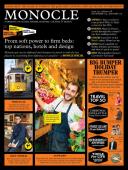
Issue 79
From soft power to film beds: top nations, hotels and design. Monocle gets out its clipboard and sharpens its pencil to rank the key players in everything from diplomacy to aviation – a Monocle special
In This Issue
Oops! No content was found.
Looks like we no longer have content for the page you're on. Perhaps try a search?
Return Home

